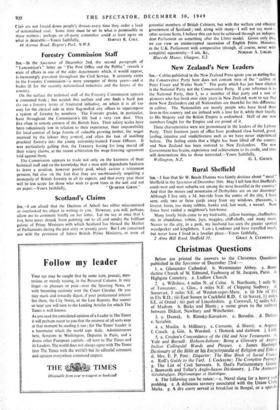Forestry CommissiOn Staff
Sta.—In the Spectator of December 2nd, the second paragraph of " Lancastrian's " letter on " The Post Office and the Public " reveals a state of affairs in one of the older departments which, it would appear, is increasingly prevalent throughout the Civil Service. It certainly exists in the Forestry Commission—a mere youngster of thirty years—and it bodes ill for the recently nationalised industries and the future of the country.
On the surface the technical staff of the Forestry Commission appears a contented body ; but scratch this surface and one finds a hard pan (to use a forestry term) of frustrated initiative, on which it is all too easy for the clerical side in their flag-staffed city offices to superimpose a system of forestry by numbers. The Forester grades, in particular, have throughout the Commission's life had a very raw deal. They live often in remote corners of the British Isles. Their salary scales have been ridiculously low in relation to their experience, their responsibility for local control of large forests of valuable growing timber, the wages received by the labour they control, and often the task of instilling practical forestry into the young university-trained Forest Officers. It was particularly galling that, the Treasury having for long staved off their salary claims, at the recent arbitration the wage-freezing agreement told against them.
The Commission appears to trade not only on the keenness of their technical staff and on the knowledge that a man with dependants hesitates to leave a position, however poorly paid, which carries a retirement pension, but also on the fact that they are unobtrusively acquiring a monopoly of British forestry in all its aspects, and that every year there will be less scope for those who wish to grow trees in the soil and not






























 Previous page
Previous page